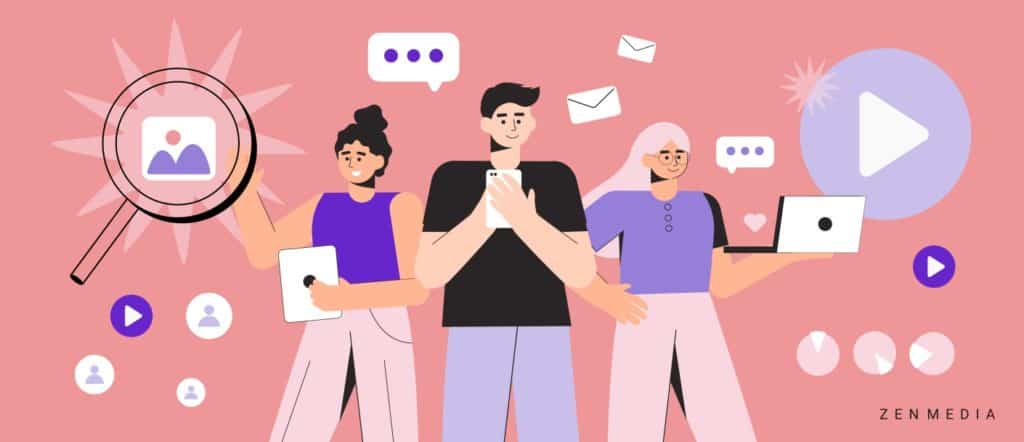There has been a lot of news in the B2B social media marketing space this year. We’ve talked about the split between social and media, the must-knows for each generation and their preferred social platforms, and, of course, the newest apps, trends, and stats that influence social media marketing for B2Bs.
But with 2023 just around the corner, we thought we’d gather the biggest developments we’ve seen in 2022 in a highlight reel for B2Bs. Without further adieu, here are Zen’s top social media marketing trends and topics for B2B marketers in 2023.
Related Reading: The Ultimate Guide to B2B Social Media Marketing
Social is the new search engine.
SEO and search engine ads are still vitally important to an overall digital marketing campaign, but many consumers are participating in social-first searching. Whether it’s a product, a recommendation, or a review, consumers are searching social media before search engines for their answers.
The way we engage with information in the digital age is changing. TikTok, and to a lesser degree, Instagram, are replacing traditional search engines. In fact, according to Google, 40% of young people prefer finding information on TikTok and Instagram over Google.
Related Reading: Gen Z Isn’t “Googling” Anymore: Social Media Is The New Search Engine
Video still reigns supreme.
Video content has been the go-to for engagement for a while now, but in 2023, we expect to see a surge in short-form video content. According to 58% of marketers, short-form videos (such as TikTok, Instagram Reels, and YouTube Shorts) are the main video format they leverage in their roles. Research also shows that audiences retain 95% of a message when it’s in video form versus 10% in text form. Ideas for brand videos include product videos, tutorials and how-to content, behind-the-scenes sneak previews, brand story videos, and interviews.
In addition to short-form video content, live streaming and live shopping are video-based tactics that are increasing in popularity. Social media live shopping can also enable one-click purchases, which takes the burden off of your prospects.
Related reading: 5 Tips to Hacking the TikTok Algorithm
Authenticity and connection are priorities driving UGC growth.
It’s no secret that authenticity is the name of the game in social media marketing nowadays. But did you know that 90% of consumers say authenticity is important to them when deciding which brands they like and support? And that’s up from 86% in 2017. What better way to dive head-first into the pool of authentic content than by using user-generated content (UGC)?
People already consume user-generated content daily. Every time they scroll through a social feed, there is almost a guarantee they’ll see the following or something similar:
- Reviews under a product or company page
- How-to videos with a user demonstrating a product or service
- A friend’s social post raving about their latest purchase
Because it’s perceived as unbiased, UGC can inspire more engagement than traditional forms of marketing content. This gives brands the opportunity to engage in social listening for business insights—enabling them to monitor social media conversations across platforms to understand and respond to the needs and wants of their audience.
Related Reading: How Your B2B Can Leverage User-Generated Content To Build Credibility
Augmented reality has entered the chat.
AR and VR have been hugely influential in the past year as AI in marketing has become more and more popular. Augmented reality through social media will allow customers to try products and services virtually, showing them exactly how a solution can solve the problem they are facing and leading to decreased buyer’s remorse. Companies can also create branded filters that increase brand awareness. Ultimately, though, AR in social media marketing is about providing an immersive experience to your audience.
According to a survey from Ipsos and Google, more than 90% of American consumers currently use or would consider using AR for shopping, with almost half of those respondents expecting AR content from automotive and beauty brands. And, sure, this is a trend in the B2C space, but as we’ve seen, B2C marketing is massively influencing the expectations of B2B consumers, so adopting early will be the key to success for B2B social media marketers.
Related Reading: B2B and B2C Converge: How B2C Trends Are Influencing B2B Marketing PR
Long-term influencer partnerships are impactful.
B2Cs have been using influencer marketing for some time now, and B2Bs have jumped on the bandwagon, with potential influencer marketing revenue projected to reach $11.7 billion by the end of 2022. But B2Bs haven’t exactly jumped on the train, with a study from this year showing that 38% of B2B companies are just exploring influencer marketing, and only 15% of executives feel they are using business influencers well.
In 2023, the value of customer trust will skyrocket, and engaging with well-known and respected business influencers will set brands away from the pack in their audience’s eyes. People want to engage with creators they trust, and creating a long-term, mutually beneficial partnership with an influencer that your audience loves is sure to influence your conversions and bottom line.
Related Reading: 10 Criteria You Should Look At When Identifying Influencers For B2B
Investments in social media ads are increasing.
In 2022, the global digital advertising marketing spend reached $602.25 billion, which is 66.4% of the total media ad spend. The total expenditure on digital advertisements for 2023 is projected to reach $681.39 billion, and a major share of it will go into social media advertising.
With increasing investments in social media ads, it’s crucial for B2Bs to use those dollars as effectively as possible—knowing where, when, and how their audience wants to be communicated to is an essential first step.
Rapid changes, new platforms, and more will continue to pop up.
By now, social media marketers will likely understand that rapid changes are expected in this industry. From algorithm updates to new platforms (like BeReal), there will always be something new to learn. It’s important to make upskilling and re-education a priority for your social marketing team to stay on top of the latest trends and make sure your brand can experiment with them sooner than later. When it comes to platform adoption in social, the early bird gets the followers.
Related Reading: Meet BeReal:Everything You Need To Know About The New Social Media App
There you have it! Zen Media’s seven biggest social media marketing trends for B2Bs to look out for in 2023. Wondering how you can implement these in your own strategy? Reach out. Our experts have you covered.





